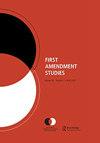Big Ag阻碍了言论自由
Q2 Social Sciences
引用次数: 4
摘要
在过去的三年里,一波试图限制言论自由的法案在美国各州议会中激增。这些法案反映了农业行业内部的一种政治策略,即阻止公众参与工业肉类生产的监管和监督。本文运用传播学理论分析了这一政治策略。具体来说,分析比较了第一套反歧视法(大约在20世纪90年代初)和最新一套反歧视法(大约在2011-2013年)的语言和意图,并认为最新的反歧视法依赖于压制言论自由。分析发现,信息框架、预先占领公共屏幕和话语封闭被用来防止负面宣传,并加强私人和公共之间的界限,这对民主实践有问题的影响。本文章由计算机程序翻译,如有差异,请以英文原文为准。
Big Ag Gags the Freedom of Expression
In the course of the past three years a wave of bills attempting to restrict freedom of expression has surged in statehouses across the United States. These bills reflect a political strategy within the agriculture industry to stifle public participation in industrial meat production regulation and oversight. This essay analyzes this ag gag legislation as a political strategy using communication theory. Specifically, the analysis compares the language and intent in the first set of ag gag legislation (circa early 1990s) with the most recent set (circa 2011-2013) and argues that the more recent ag gag legislation hinges on repressing the freedom of expression. The analysis finds message framing, pre-empting the public screen, and discursive closure, are utilized to prevent negative publicity and reinforce the boundary between private and public with problematic implications for democratic practices.
求助全文
通过发布文献求助,成功后即可免费获取论文全文。
去求助
来源期刊

First Amendment Studies
Social Sciences-Law
自引率
0.00%
发文量
0
期刊介绍:
First Amendment Studies publishes original scholarship on all aspects of free speech and embraces the full range of critical, historical, empirical, and descriptive methodologies. First Amendment Studies welcomes scholarship addressing areas including but not limited to: • doctrinal analysis of international and national free speech law and legislation • rhetorical analysis of cases and judicial rhetoric • theoretical and cultural issues related to free speech • the role of free speech in a wide variety of contexts (e.g., organizations, popular culture, traditional and new media).
 求助内容:
求助内容: 应助结果提醒方式:
应助结果提醒方式:


